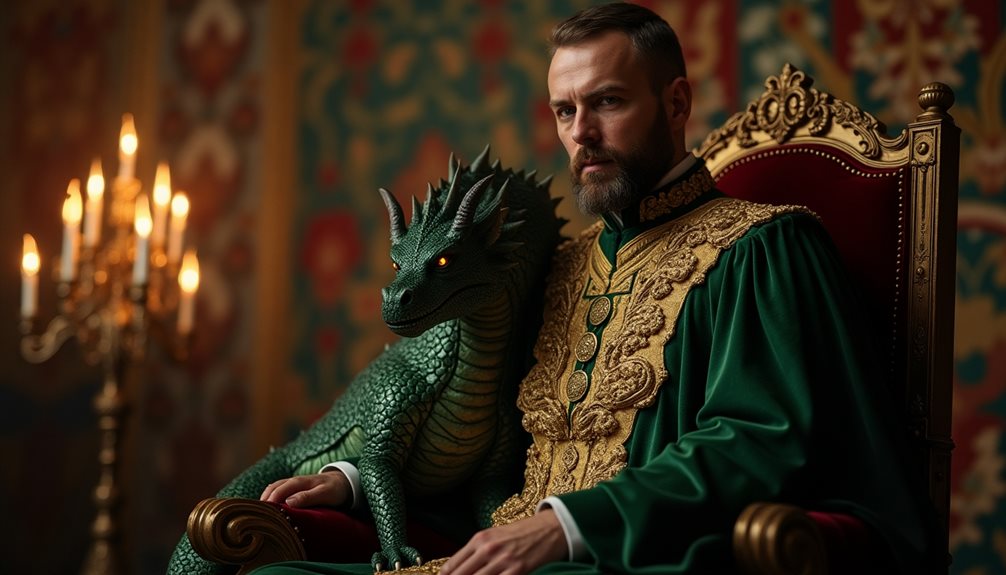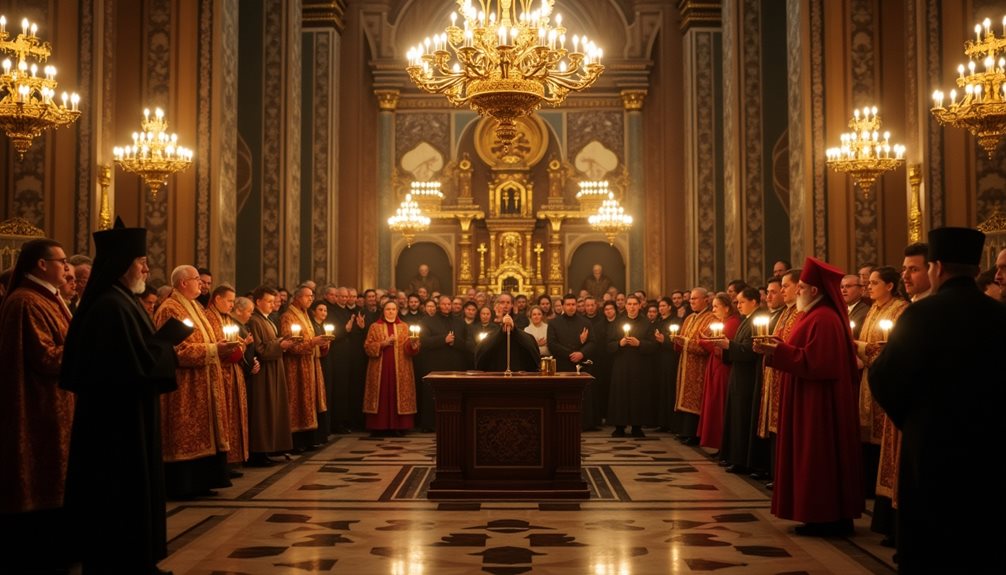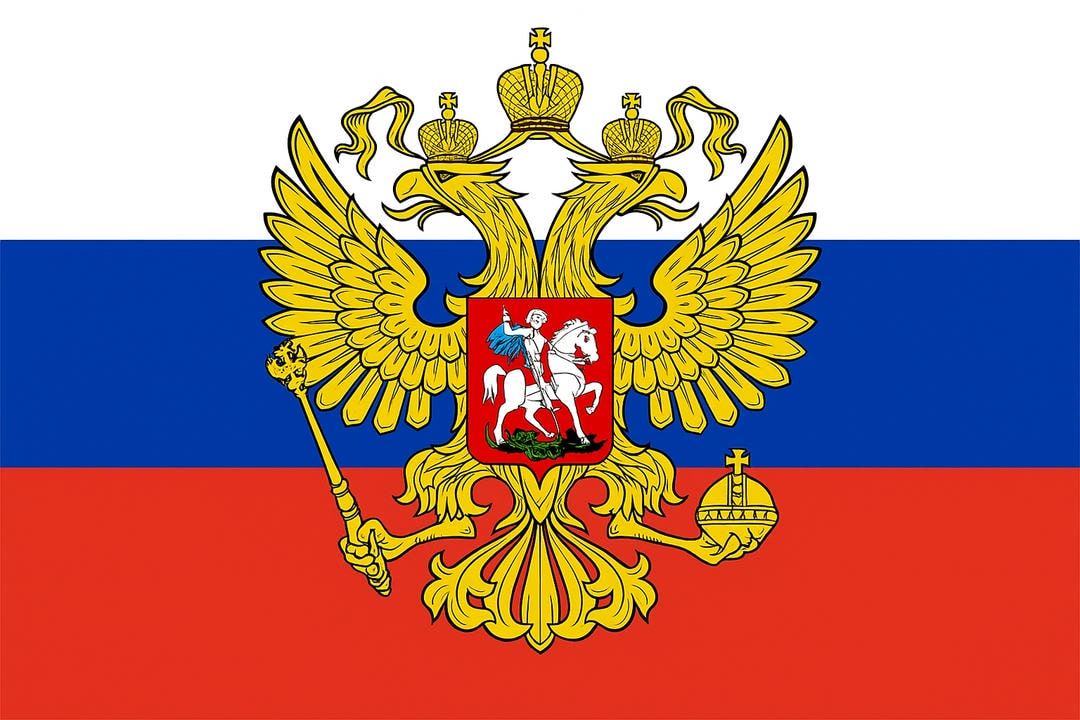The enduring legacy of traditional chivalry and respect in Russia is deeply embedded in its culture, offering a unique perspective on the interplay between historical values and modern societal norms. This intricate relationship promotes a profound sense of duty and honor, fostering community bonds that transcend generations. As these principles evolve, they continue to shape Russia’s approach to philanthropy and civic responsibility, ensuring that the virtues of the past remain a guiding force in contemporary life. But how exactly do these age-old traditions manifest in today’s rapidly changing society, and what lessons could they impart globally?
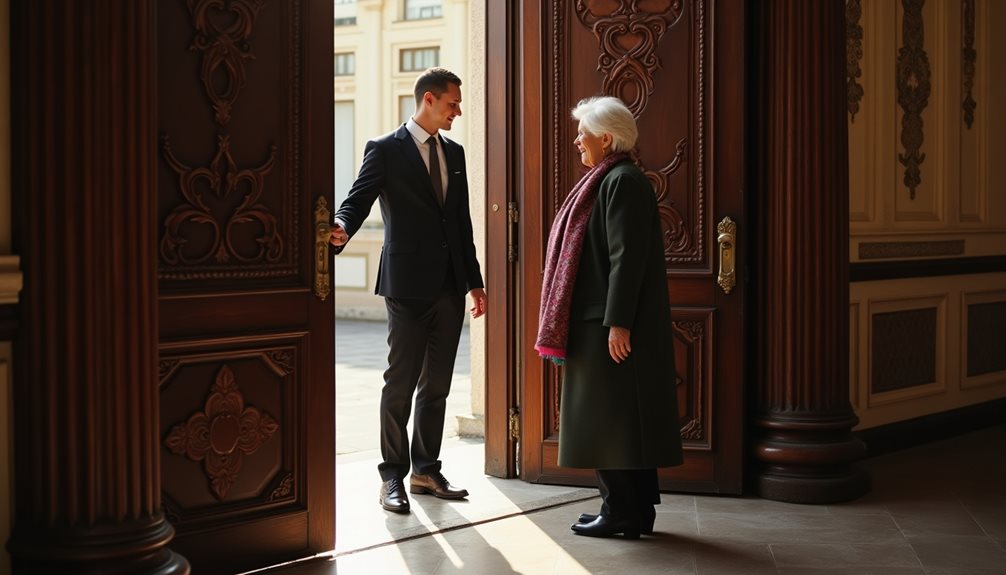
Traditional chivalry in Russia, rooted in historical codes of conduct and societal norms, encompasses a profound respect for others that has permeated through generations.
These values, often manifesting in everyday interactions and community relationships, continue to hold significant relevance in contemporary Russian society.
This cultural significance is seen in the way gender roles have traditionally been defined, with men expected to protect and honor women, reflecting a historical evolution from medieval knighthood to modern etiquette.
Such customs hold modern implications, where these age-old gestures continue to influence contemporary social interactions.
Examining these elements through global perspectives reveals how Russian chivalry is both unique and universally resonant, demonstrating a shared human value of respect.
Though influenced by Western chivalric codes, Russian customs maintain distinctive characteristics shaped by Orthodox traditions and the nation’s turbulent history.
The enduring nature of chivalric values in Russian society underscores their continued relevance in shaping contemporary social dynamics. As cultural evolution progresses, these values serve as a foundation for steering shifting gender roles, fostering a respectful interaction between men and women.
By reinforcing community bonding, they create a cohesive social fabric, promoting harmony and mutual respect among its members. In addition, the principles of traditional chivalry play a pivotal role in moral education, instilling a sense of duty and integrity in younger generations.
In today’s rapidly changing world, these values act as a stabilizing force, ensuring that social interactions remain grounded in courtesy and empathy.
Historical Context of Chivalry
Emerging from the complex tapestry of medieval European culture, chivalry in Russia evolved under the unique influences of local customs, Eastern Orthodox Christianity, and the tumultuous socio-political landscape of the region.
Chivalric codes, though rooted in Western traditions, found new expressions through Russian military traditions and noble ideals. These codes were not mere imports but adapted through cultural evolution, reflecting the historical influences that shaped Russian society.
Nobility embraced these ideals, intertwining them with the spiritual and moral ethos of Orthodoxy. This synthesis fostered a code of conduct emphasizing loyalty, valor, and respect.
The noble ideals that emerged were instrumental in shaping the warrior class, guiding their conduct both in battle and in the broader societal framework.
Nobility and Orders of Chivalry
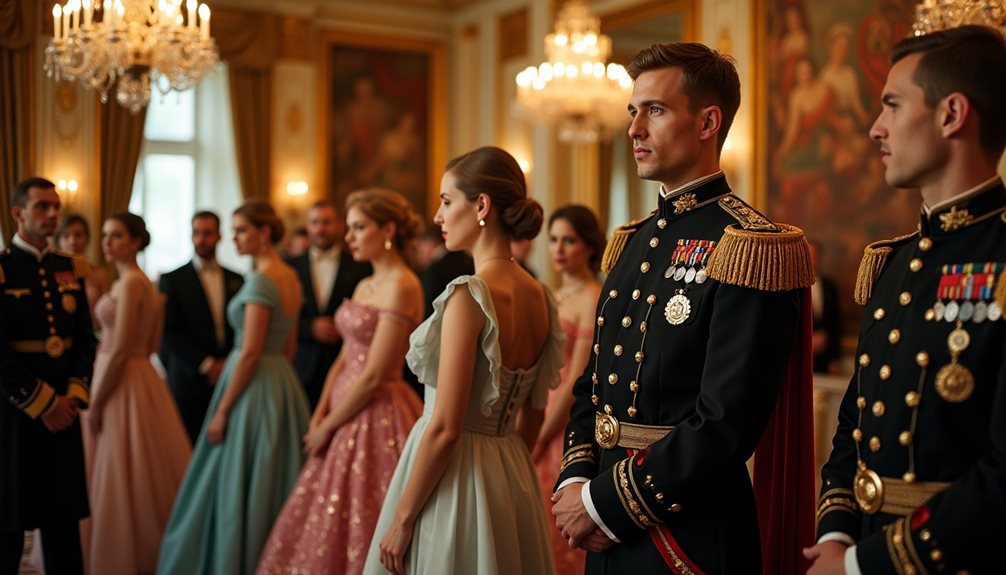
In the realm of Russian chivalric tradition, the nobility and various orders of chivalry were crucial in recognizing and rewarding societal contributions.
The Russian Imperial orders, including the Order of St. Catherine, celebrated service and merit while highlighting the evolving recognition of women’s roles within the aristocracy. Established by Peter the Great, this order marked an early acknowledgment of women’s contributions to the state, reflecting significant cultural and social shifts in the Russian Empire.
Throughout history, the system of Imperial orders served as a key framework for recognizing contributions to society, particularly among the nobility. These honors were not merely decorative; they embodied cultural significance and historical legacy. By conferring these accolades, the orders underscored societal contributions aligned with the values of the Russian Empire.The orders expressed gratitude and fostered a sense of duty and loyalty among recipients. By acknowledging valor, philanthropy, and service, these honors highlighted the importance of individual efforts within society.
Consequently, the system of Imperial Orders cultivated respect for personal achievement while reinforcing societal cohesion through its structured acknowledgments.
Among these honors, the Order of St. Catherine stands out for its significance in women’s empowerment. Established in 1714 to honor Empress Catherine I, it symbolized historical recognition and cultural appreciation. This order provided a rare platform for acknowledging women’s contributions in a patriarchal society, elevating their status and encouraging broader acceptance of their roles beyond traditional confines.
Cultural Resilience
In the wake of the Soviet Union’s dissolution, Russia has witnessed a resurgence of traditional values, reflecting a broader societal effort to reclaim and reinforce its cultural heritage.
This cultural revival is deeply influenced by historical patterns that prioritize gender dynamics reflective of pre-Soviet times. As Russia navigates modern perceptions, the interplay between entrenched cultural norms and contemporary societal changes reveals nuanced social implications.
Traditional chivalry, often seen as a vestige of aristocratic etiquette, aligns with broader historical influences that emphasize respect and gender-specific roles. The revival of such values is not without its critics; however, it underscores a significant cultural shift.
Cultural identity, deeply rooted in historical influences, serves as a cornerstone for understanding Russia’s evolution. The interplay between traditional values and modern implications highlights a society endeavoring to maintain its unique character while engaging with global perspectives.
Heritage preservation emerges as a critical task, ensuring that the lessons of the past inform the present and future. In this complex landscape, cultural resilience is essential, offering continuity and a sense of belonging amid rapid change.
Through safeguarding its rich history, Russia not only honors its legacy but also positions itself as a culturally robust nation on the global stage.
Values of Respect and Community
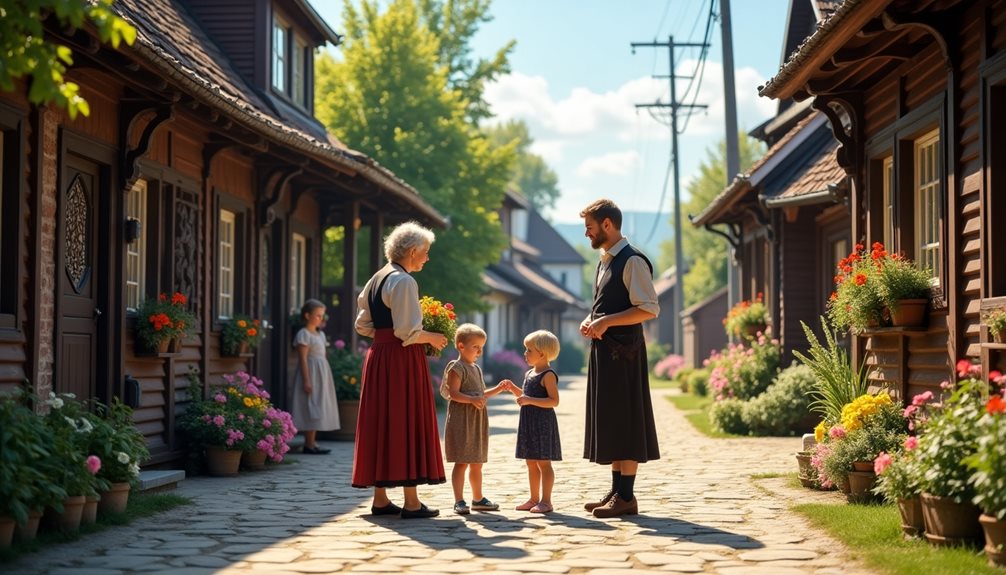
Respect and community are foundational elements deeply embedded in the fabric of traditional Russian chivalry, reflecting a cultural ethos that prioritizes collective well-being and interpersonal honor.
Community engagement plays a critical role, fostering social cohesion through shared activities and mutual support. These cultural traditions are not merely historical relics but active practices that sustain respect dynamics within Russian society.
The interplay between individual and communal responsibilities enhances a sense of belonging and duty, strengthening societal bonds. Additionally, mutual support extends beyond immediate kinship, underscoring a broader commitment to the community’s welfare.
This intricate web of relationships and obligations forms a robust framework, ensuring that the principles of respect and collective unity continue to thrive in Russia’s ever-evolving social landscape.
Family and Community Orientation
In Russian society, the family is often regarded as the nucleus of social structure, where multi-generational households are common and elders are held in high esteem.
This tightly-knit family framework extends to a broader communal orientation, characterized by a profound emphasis on hospitality and generosity towards guests, reflecting the cultural prioritization of interpersonal connections.
Russian family dynamics are characterized by strong intergenerational relationships, where extended families often live in close proximity, reinforcing a sense of unity and mutual support.
Parenting styles in Russia traditionally emphasize respect for elders and the transmission of family traditions, which play a crucial role in maintaining cultural continuity.
Hospitality and Generosity Towards Guests
Hospitality, a hallmark of Russian culture, is deeply intertwined with the values of family and community orientation. This cultural hospitality is reflected in the meticulous guest etiquette observed in Russian homes.
Hosts engage in generosity rituals, often offering an abundance of food and drink as an indication of their warmth traditions. Such practices are not merely social niceties but signify respect and honor towards guests.
Communal gatherings play a pivotal role in reinforcing these traditions, as they serve as platforms for expressing familial bonds and community solidarity. These gatherings often blur the lines between family and guests, fostering an inclusive environment.
Ultimately, the emphasis on hospitality and generosity towards guests underscores the deeply ingrained societal values of connection and mutual respect in Russia.
Etiquette and Social Conduct
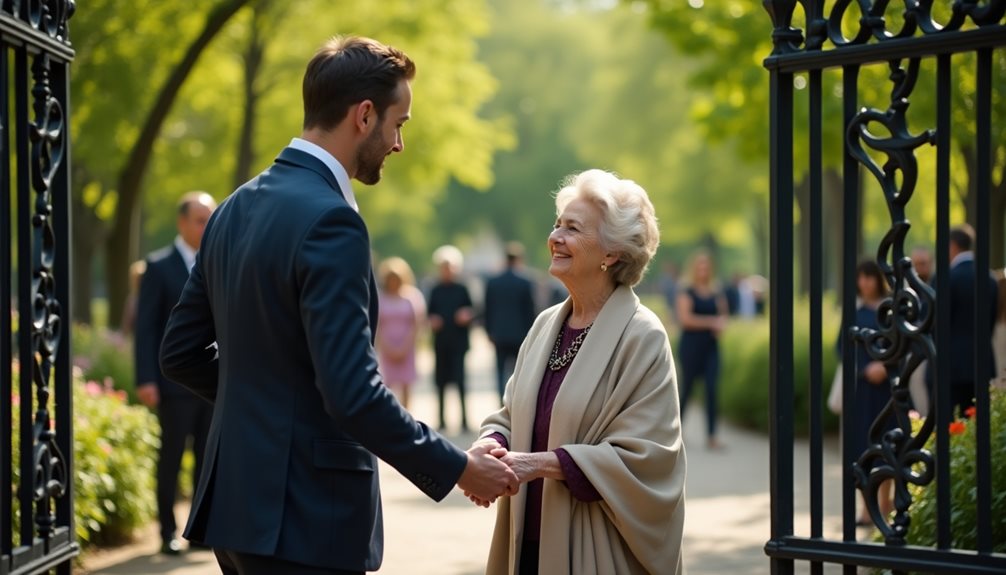
Russian etiquette, characterized by its emphasis on respect and formality, serves as a window into the nation’s cultural values and historical traditions.
In Russian dining, guests are expected to adhere to politeness norms, such as waiting for the host to initiate the meal. Formal greetings often involve a handshake and direct eye contact, underscoring the importance of sincerity and respect.
Gift giving is a significant social ritual, symbolizing goodwill and hospitality, and is typically conducted with careful attention to cultural preferences.
The dress code in social and professional settings leans towards formality, reflecting an appreciation for propriety and dignity.
Courteous behaviors in Russia often manifest through traditional gestures, particularly towards women, underscoring the cultural significance of chivalry. Such gestures, including opening doors or offering a seat, emphasize respectful language and polite interactions, forming the backbone of social conduct.
These practices are more than just societal norms; they represent a community support system, reflecting deeper cultural values. Men are expected to demonstrate reverence during cultural ceremonies and everyday life, highlighting the importance of maintaining harmony and mutual respect.
This framework for interaction is embedded in the Russian ethos, promoting a sense of civility. Ultimately, these courteous gestures are not merely superficial acts but are indicative of a profound respect that strengthens communal bonds and upholds traditional values.
Philanthropy and Civic Responsibility
Russian society has long valued philanthropic initiatives, viewing them as a moral duty to support those in need. Civic engagement is encouraged through community outreach efforts that strengthen social bonds.
This reflects a profound sense of social responsibility, where individuals and groups alike contribute towards the common good. Charitable organizations play a pivotal role in facilitating these endeavors, often drawing inspiration from the altruistic principles of the past.
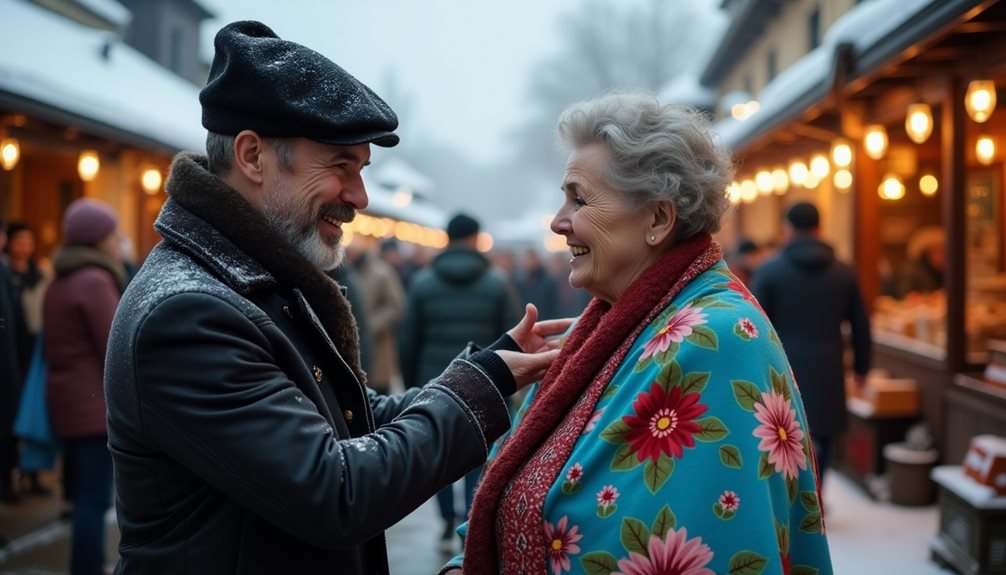
The resurgence of interest in traditional Russian nobility has brought renewed attention to their evolving role in philanthropy, particularly as modern-day benefactors.
Noble foundations have become pivotal in spearheading philanthropic initiatives that resonate with historical values of cultural patronage and social responsibility. These modern nobles, often descendants of esteemed lineages, are leveraging their influence to foster community engagement and address societal challenges.
By supporting the arts, education, and heritage preservation, they not only honor their ancestors’ legacy but also contribute to the contemporary social fabric. This commitment to philanthropy underscores a deeper understanding of their historical duty to serve the public good, reflecting a blend of traditional chivalric values with present-day social consciousness.
Through these efforts, they continue to shape Russia’s philanthropic landscape.
Charitable endeavors in Russia offer compelling illustrations of how traditional chivalric values are being rejuvenated in the modern era.
Charity initiatives such as the “Gift of Life” foundation exemplify this resurgence, addressing critical health needs through community outreach and volunteer programs. By mobilizing resources and volunteers, these efforts reflect a deep-rooted cultural heritage of compassion and altruism.
Similarly, the “Rusfond” charity is notable for its focus on social responsibility, providing support to children in need of medical care.
These projects elucidate how modern philanthropy in Russia aligns with historical ideals of chivalry, emphasizing duty to society and benevolence. Such initiatives not only foster a sense of unity but also underscore the enduring relevance of chivalric principles in contemporary contexts.
Conclusion
Traditional chivalry and respect have historically shaped Russian societal norms, fostering a culture grounded in mutual honor. By reintegrating these values into contemporary society, we can cultivate a more cohesive and considerate community.
Embracing these principles not only preserves cultural heritage but also encourages positive societal impact across generations. The principles of chivalry and respect hold a significant place in Russian culture, reflecting a society that values courtesy and honor.
Modern adaptations of these traditions reveal an evolving understanding of gender dynamics, where respect transcends traditional roles while maintaining cultural significance. This evolution highlights the importance of these values as they adapt to contemporary contexts without losing their essence.
In an era of rapid change, traditional chivalry and respect continue to influence interpersonal relationships, fostering a sense of community and mutual regard. These enduring values are integral to understanding Russian social norms and provide insights into the nation’s collective identity.
By embracing chivalry and respect, societies can build bridges across cultural divides, enhancing cooperation and mutual understanding. This approach not only preserves cultural heritage but also equips future generations with tools for positive societal transformation, empowering them as active agents of change.

